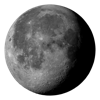NGC 49 - Lenticular Galaxy in Andromeda
NGC 49 is a Lenticular Galaxy in the Andromeda constellation. NGC 49 is situated north of the celestial equator and, as such, it is more easily visible from the northern hemisphere. Given its B magnitude of 15.3, NGC 49 is visible with the help of a telescope having an aperture of 20 inches (500mm) or more.
The image below is a photograph of NGC 49 from the Digitized Sky Survey 2 (DSS2 - see the credits section) taken in the red channel. The area of sky represented in the image is 0.5000x0.5000 degrees (30.00x30.00 arcmins).

Celestial Coordinates
Apparent
J2000
Finder Chart
The simplified sky charts below show the position of NGC 49 in the sky. The first chart has a field of view of 60° while the second one has a field of view of 10°.


Photometric Information
The following table lists the magnitude of NGC 49 in different bands of the electomagnetic spectrum (when available), from the B band (445nm wavelength, corresponding to the Blue color), to the V band ( 551nm wavelength, corresponding to Green/Yellow color), to the J, H, K bands (corresponding to 1220nm, 1630nm, 2190nm wavelengths respectively, which are colors not visible to the human eye).
For more information about photometry in astronomy, check the photometric system article on Wikipedia.
The surface brightess reported below is an indication of the brightness per unit of angular area of NGC 49.
Apparent Size
The following table reports NGC 49 apparent angular size. The green area displayed on top of the DSS2 image of NGC 49 is a visual representation of it.Morphological Classification
NGC 49 - Lenticular Galaxy in Andromeda is classified as Lenticular (S0) according to the Hubble and de Vaucouleurs galaxy morphological classification. The diagram below shows a visual representation of the position of NGC 49 - Lenticular Galaxy in Andromeda in the Hubble de Vaucouleurs sequence.

Credits for the background image: Antonio Ciccolella / M. De Leo / CC BY
Rise and Set Times
Location: Île-de-France, France
Latitude: 0° 00’ 00” N
Longitude: 0° 00’ 00” E
Timezone: UTC
Today's NGC 49 - Lenticular Galaxy in Andromeda rise, transit and set times from Île-de-France, France are the following (all times relative to the local timezone UTC):










